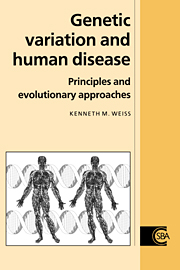Book contents
- Frontmatter
- Contents
- Frontispiece
- Preface: what is this book all about?
- Notational conventions used in this book
- List of abbreviations
- Part I Genes and their expression
- Part II Introduction to genetic epidemiology: inference from observational data
- Part III Evolution: the time dimension in populations
- Part IV Modification of the inherited genotype: the time dimension in individuals
- Afterwords: towards a unified general model
- References
- Index
Preface: what is this book all about?
Published online by Cambridge University Press: 05 June 2012
- Frontmatter
- Contents
- Frontispiece
- Preface: what is this book all about?
- Notational conventions used in this book
- List of abbreviations
- Part I Genes and their expression
- Part II Introduction to genetic epidemiology: inference from observational data
- Part III Evolution: the time dimension in populations
- Part IV Modification of the inherited genotype: the time dimension in individuals
- Afterwords: towards a unified general model
- References
- Index
Summary
From the beginning of evolutionary population biology, studies of genetic disease have had an important place in the attempt to understand the relationship between the genes we inherit and the traits, or phenotypes, that we manifest during life. Diseases attract our deep personal interest. What causes them? Can they be inherited? Will I be affected? The very existence of genes that lead to traits that are deleterious to the individual also poses an apparent challenge to the idea of adaptive evolution by natural selection: how can such genes give rise to anything other than trivial frequencies?
This is an exciting time to be working in human genetics. A host of new statistical and molecular methods have become available in recent years; they enable us systematically to answer fundamental questions that previously we could only speculate about. Major new successes appear in the popular and scientific press every week, as genes related to one disease after another are identified. This has captured public imagination and its hopes. What is this all about? What does it tell us about basic biology?
In fact, the application of new methods to problems in genetic disease has, along with other developments in biology, led to a number of new generalizations about the genetic control of biological phenotypes that were unpredicted by classical evolutionary genetic theory, and which lead us to a revised view of genetic variation, how it works, and of the relationship between genotype and phenotype.
- Type
- Chapter
- Information
- Genetic Variation and Human DiseasePrinciples and Evolutionary Approaches, pp. xv - xixPublisher: Cambridge University PressPrint publication year: 1993



